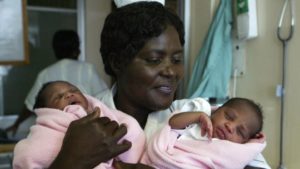
John Wilmoth: Putting the population in perspective:
“There’s been a substantial reduction in the death rate in Africa, like in other parts of the world, and this is good news in many ways – children survive in much greater numbers to adulthood and adults survive to old age.
“However, what’s preventing that kind of movement in a similar direction to what’s happening in the rest of the world is our continued levels of high fertility.
“You always have three things together: you have high fertility, rapid growth and young populations.
“Currently in Africa we estimate that 41% of the population is under the age 15. This is a very high fraction. Another 19% are between ages 15 and 24. So if you add those two together you’ve got three-fifths of the population that is under the age of 25.
“We really need political will at the highest levels paying attention to this issue because it really will affect the ability of those countries to raise the standard of living for their populations, and it will have long-term implications for the well-being of that part and the rest of the world as well.”
“If you go to many of our cities these days they’re much more crowded than ever. So huge challenges are deriving from the population increase, and it is quite palpable. You could see it not only in heavy traffic, but also pressure on social services, the water, electricity, schools and the rest of it.
“From an economist’s point of view, it’s often the case that increase in population is synonymous with increase in GDP, because you have more labour force, more consumption, more spending.
“So it tends to be reflected in an overall rise in GDP. But in this day and age quantitative growth is not enough. It’s not the ultimate indicator of better conditions for citizens.
“In some of our biggest airports, there is now pressure on space for parking of private jets. And yet the streets are booming with poor people, people hustling in the streets because they have no opportunities and no hope for the future.
Read more at www.bbc.com


